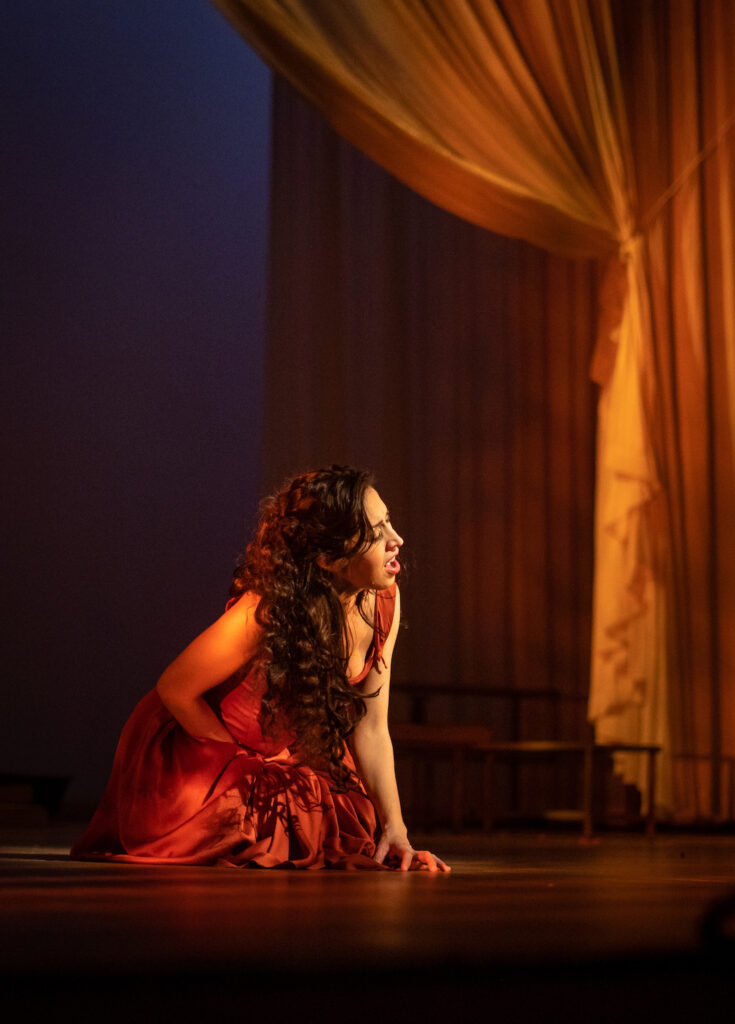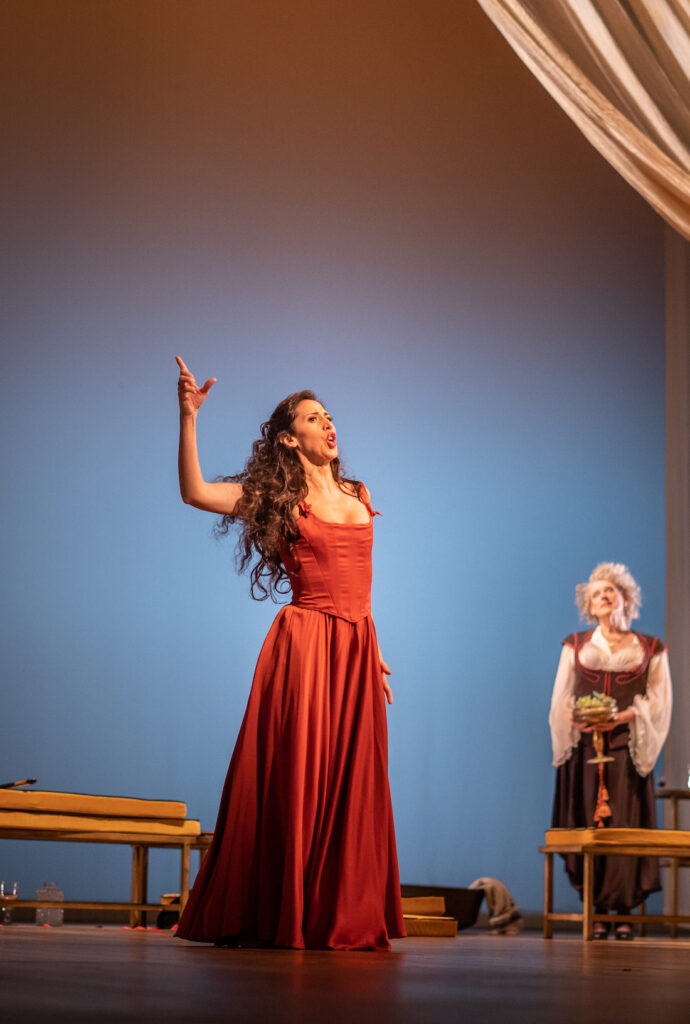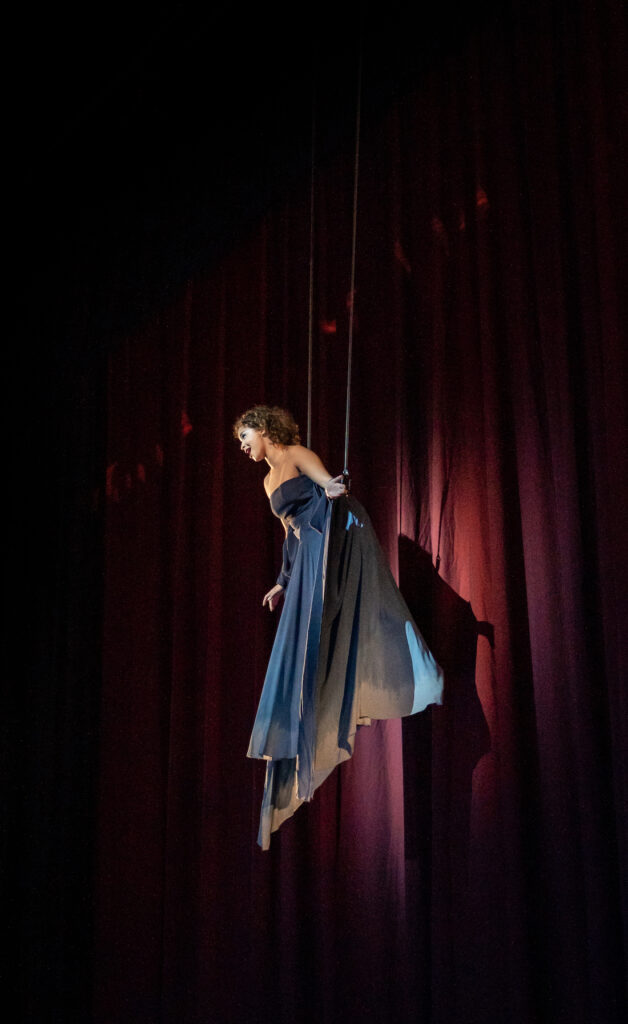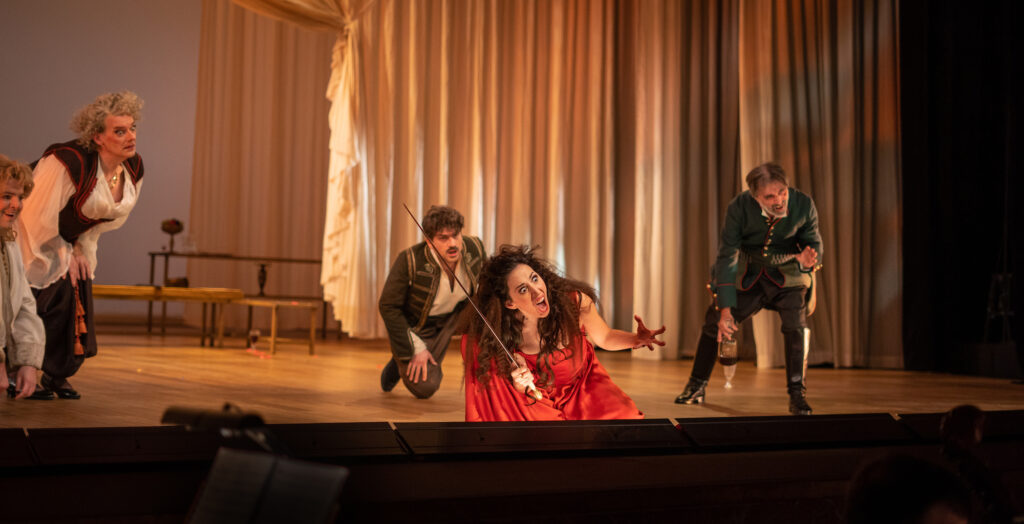

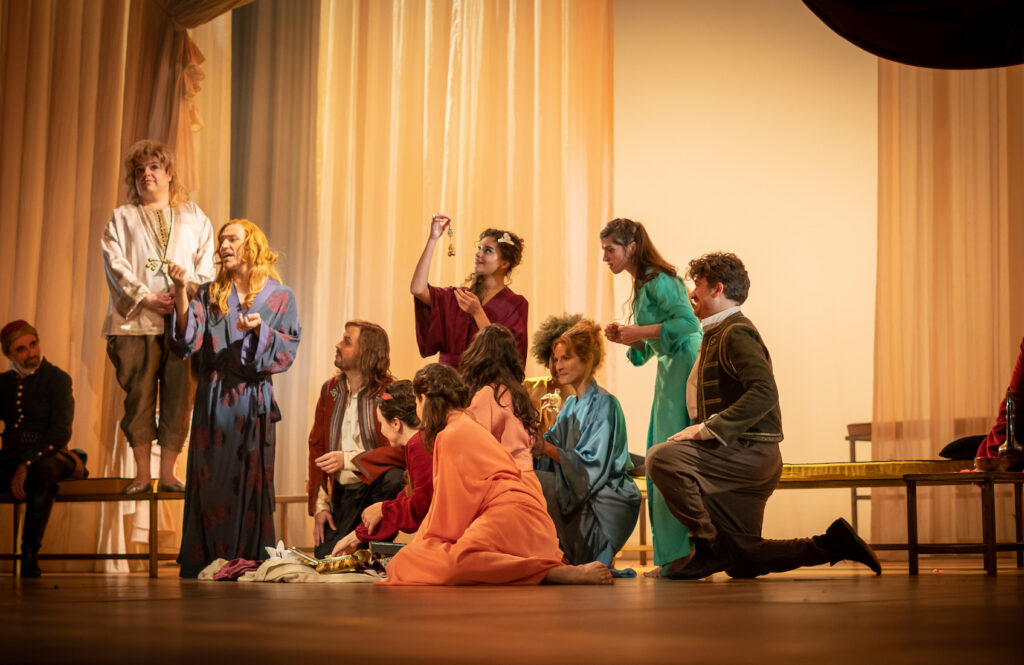
“The feminist and anti-military message is vehemently defended by Mariana Flores in an explosive performance. With her superb red dress, she is the epicentre of the show.”
Jean-Luc Clairet for Resmusica
The premiere of La finta pazza it was the first opera by composer Francesco Sacrati and featured the first stage machinery developed by Giacomo Torelli, as well as the first prima donna in history with soprano Anna Renzi, for whom Sacrati composed the first operatic “mad scene”. Thanks to its success, it became the first opera to go on tour and was performed throughout northern Italy and in Paris in 1645, before a young Louis XIV. This performance was key to the development of French opera. For more than three centuries, La finta pazza only survived through libretto, which skilfully plays on all the codes of Venetian opera: earthly and celestial dimensions, cross-dressing and gender switching, metatheatrical allusions, and a mise en abime of the performance space and singing. Sacrati’s music could only exist in our imaginations, until 1983 when a copy of the score was uncovered, at last providing us with insight into the music of the man whom Giacomo Badoaro called “the moon to Monteverdi’s sun” and who has been identified by many musicologists as the composer of “Pur ti miro”, the famous duo that brings Monteverdi’s L’Incoronazione di Poppea to a close.
Francesco Sacrati, Music
Giulio Strozzi, Libretto
Performed in Italian with French surtitles
When an oracle predicted that Thetis’ son Achilles will die in battle if he goes to war against Troy, Thetis decides to hide him on the island of Scyros, disguised as one of King Lycomedes’ daughters. There, Achilles begins a secret love affair with Deidamia, Lycomedes’ daughter, who gives him a son named Pyrrhus. Juno and Minerva persuade Thetis to let her son go to war, as without him, the Greeks cannot defeat the Trojans. Achilles prepares to set sail with Ulysses and Diomedes, who is in love with Deidamia. The two men have been sent to enlist him and stir his appetite for battle. Feeling neglected, Deidamia pretends to be mad so that Achilles will stay with her and marry her. The ploy works and before leaving, Achilles officially proclaims his love for her and Deidamia introduces their son to everyone.
Mariana Flores, soprano – Deidamia
Filipo Mineccia, countertenor – Achille
Carlo Vistoli (2019) / Gabriel Jublin (2022), countertenor – Ulisse
Valerio Contaldo, tenor – Diomede
Alejandro Meerapfel, bass – Licomede
Kacper Szelążek, countertenor – Eunuco
Marcel Beekman, tenor – Nodrice
Salvo Vitale (2019) / Alexander Miminoshvili (2022), bass – Capitano
Julie Roset, soprano – Aurora / Giunone
Fiona McGown, soprano – Tetide / Vittoria
Scott Conner (2019) / Alexander Miminoshvili (2022), baritone-bass – Vulcano / Giove
Norma Nahoun, soprano – Fama / Minerva
Ruben Ruf (2019), Pirro
Leonardo García Alarcón, musical director
Cappella Mediterranea
Jean-Yves Ruf, stage director
Anaïs de Courson, assistant stage director
Laure Pichat, set designer
Fanny Gamet, assistant set designer
Claudia Jenatsch, costume designer
Christian Dubet, lighting
Cécile Kretschmar, wigs
“This revival in Versailles reveals the qualities of this opera and the intelligence of the production concocted by Jean-Yves Ruf (on stage) and Leonardo García Alarcón (in the pit). We are struck by the poetry and humour of the staging; the libretto, which insolently explores gender troubles; and the music, which is entirely at the service of the drama. Above all, we must applaud the incredible Cappella Mediterranea, the dazzling soprano Mariana Flores in the title role, and a superbly homogeneous vocal ensemble.”
Sophie Bourdais for Télérama
See full article
“As Leonardo García Alarcón affirms, even if we can’t pinpoint Sacrati’s style, his only surviving work shows great inventiveness. Notably, it contains ornamentation and chords that were thought to have arrived much later. The Argentinian conductor has used his expertise and passion to bring this score back to life. […] In the pit, Cappella Mediterranea opens the doors to a veritable treasure trove. Shimmering colours alternate with darker tones, illuminated by lights that vary according to the events and atmospheres, while the continuo displays superb ductility. The small orchestra is in perfect harmony with the stage. What’s more, there is a clear sense of complicity between all the artists, as though they are all part of the same troupe.”
Jean-Marc Piriou for Bachtrack
See full article
“In the programme, the conductor credits Sacrati twice as the composer of Pur ti miro from L’Incoronazione di Poppea. We’re inclined to believe him, as the melodies of La Finta Pazza are so close to the Monteverdian hit. The plot is always moving forward. There are no arias. Nothing is ever said twice. And yet the music never sinks into the recitative blackholes characteristic of a genre that was still defining itself. The ravishing Canzonnette a tre voci and the suspense of the final call for Achilles to join the Trojan War are neither developed nor repeated. The music, which is perfectly compatible with the words, was composed as if it would only be heard once, and the dense beauty of it kept the audience mesmerised for two and a half hours.”
Jean-Luc Clairet for ResMusica
See full article
“The role of Deidamia in La Finta Pazza was immortalised by Anna Renzi in 1641. Soprano Mariana Flores takes on the role with a powerful voice that is warm and unctuous, capable of expressing both tenderness and drama. The singer’s energy and commitment to the stage and music are remarkable. Her voice can caress but also rival military trumpets in its bellicose outbursts. The pièce de résistance is of course the mad scene, which allows her to display not only her musical skills, but also her acting skills. She surprises, moves, delights and wins over the audience, who cheer her on at the end of the performance.”
Caroline Mounier-Vehier for Olyrix
See full article
“The rare ensemble numbers (the canzonetta in the first act and the chorus in the finale) are a delight. Deidamia, a role written for the first prima donna in history, Anna Renzi, is Mariana Flores, who is younger than ever, lively, playful and moving. The sound, timbre and agility of her voice is a joy to behold. Carlo Vistoli, who is well known to all lovers of Baroque singing, plays an endearing Ulysses. Filippo Minecchia’s Achilles is superb, making the role of the young lover who turns into an invincible warrior believable. Kacper Szelazelk (the eunuch) is equally delightful. He is perfectly paired with Marcel Beekman in the comic and vocally demanding role of the monstrous nanny. Each of the 15 singers in the cast deserves to be mentioned. The performers, who act like a real troupe, are all intimately familiar with 17th century Italian repertoire and are often brought together by Leonardo García Alarcón.”
Adrien de Vries for ClassiqueNews
See full article
“The theatrical dynamics deployed by the conductor’s Cappella Mediterranea are matched by a visually seductive performance, with the goddesses arriving by air, a variety of sets and costumes (designed by Laure Pichat and Claudia Jenatsch, respectively), and the use of a red stage curtain to represent the sail of the boat on which Ulysses and Diomedes arrive. This is the contemporary equivalent of the methods used by the great set designer, Giacomo Torelli, in the first production. The actors are well directed. Filippo Mineccia, in particular, moves with great naturalness and ease (without ever making us laugh) from the role of a delicate woman to that of a virile warrior.”
Stéphane Lelièvre for Olyrix (production Dijon)
See full article
“Conductor Leonardo García Alarcón, aided by his superb ensemble, Cappella Mediterranea, dazzles us with his “cartoonish” reading of the work. He conveys the textures and tempi of this rare gem, linking instrumental interplay with theatre and the song. He draws us into a whirlwind of sound, which sometimes boils over but other times simmers, like the accompaniment of a silent film. Jacopo Raffaele’s performance on the organ and harpsichord will leave you breathless.”
Thibault Vicq for OperaOnline
See full article
Rediscover Francesco Sacrati’s Italian opera, La Finta Pazza, which was first performed in France in 1645! Will Deidamia prevent her lover Achilles from going to war in Troy? The Oracle was clear: the valiant Achilles is essential to the capture of Troy, but instead of glory, he will meet his death. The young princess Deidamia, daughter of King Lycomedes of the island of Scyros, resorts to all kinds of ruses to delay Achilles’ departure, even feigning madness! But neither heroes nor mortals can escape their fate. The production is conducted by Leonardo García Alarcón, with his ensemble, Cappella Mediterranea, and directed by Jean-Yves Ruf.
